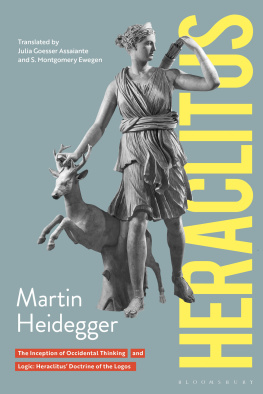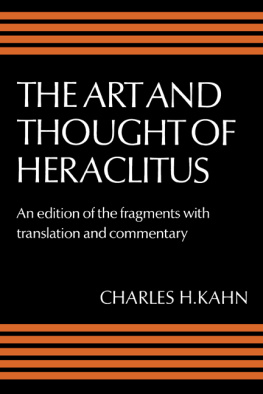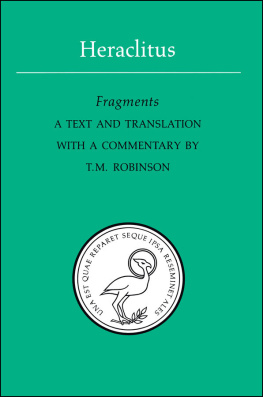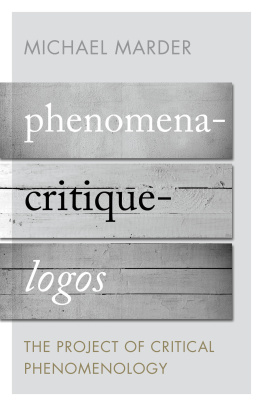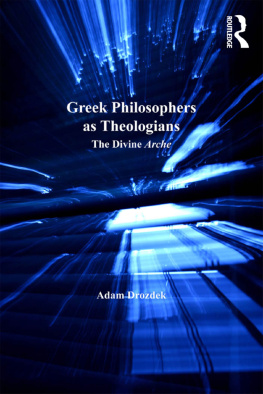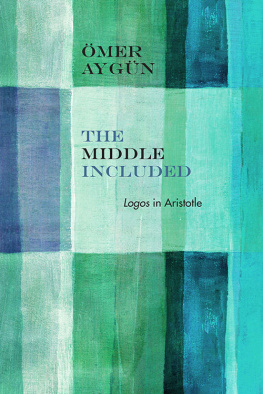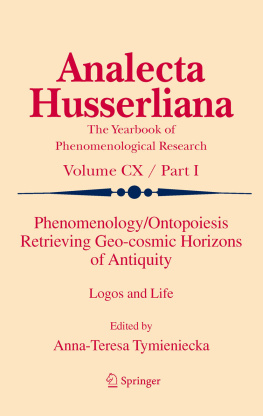
HERACLITUS
ALSO AVAILABLE FROM BLOOMSBURY
Nature, History, State, Martin Heidegger
Towards the Definition of Philosophy, Martin Heidegger
Basic Problems of Phenomenology, Martin Heidegger
Mindfulness, Martin Heidegger

CONTENTS
In the realm of transportive translation, all translations are poor, only more or less so.
Martin Heidegger, GA 55, 45
The following is the first complete English translation of Volume 55 of Martin Heideggers Gesamtausgabe, published by Vittorio Klostermann in 1979 (three years after Heideggers death) and revised in 1987. Edited by Manfred Frings, GA 55 contains two lecture-courses offered by Heidegger at the University of Freiburg: the first, The Inception of Occidental Thinking (given in the Summer semester of 1943); the second, Heraclituss Doctrine of the Logos (given in the Summer semester of 1944). Taken together, these two lecture-courses offer Heideggers most sustained and focused engagement with the early-Greek thinker Heraclitus, whom Heidegger considered to be one of only three thinkers (the others being Anaximander and Parmenides) who thought within the region of the inception of Occidental thinking, and who thought something of that inception itself.
Heideggers playfulness with the German language is at its best in GA 55a play that is a joy to read, but is often difficult (and occasionally impossible) to translate adequately into English. As anybody who has read Heidegger in German knows, the path and trajectory of his thinking is much more visible in the German language than it is in English, as the connections between words (and therefore concepts) are more conspicuous in the former. While many of our word choices in the translation that follows were governed by a desire to maintain and display Heideggers wordplay, the chasm between the English and German languages often made this impossible (or, at the very least, insufferably awkward). In light of this, we have done our best to preserve the spirit (and spiritedness) of Heideggers text, while simultaneously rendering an enjoyable and mellifluous translation. To aid the reader in getting underway, a few words should be said regarding some of the more prominent terms that appear within the lecture courses. (For a more extensive list of German words and our translations of them, please see the Glossary provided at the end of this volume.)
Two of the most fundamental German words at play within the volumeand certainly of the first lecture courseare Aufgehen and Untergehen. For reasons that we hope will become quickly obvious, we elected to translate these terms as emerging and submerging respectively, a rendering that allowed us to capture the directionality of these German terms (auf- and unter-), while still employing a common root (as is the case with the German). This latter consideration is important given the manner in which Heidegger thinks these terms (and the processes they name) as inseparable, and as being grounded in a more fundamental process of Gehen. Still, even while emerging and submerging are, in our view, the best-suited English terms available to make manifest the process that Heidegger is describing, they are nonetheless inadequate to capture every nuance of Aufgehen and Untergehen of which Heidegger makes use within this volume, as would be any other rigid pair of English terms. The ability to catch all of these nuances demands a patience and flexibility of thinking that we encourage all readers of this volume to practice.
Throughout the volume, and especially in the first lecture course, Heidegger makes great use of a cluster of related terms all sharing a common etymological (and, for Heidegger, conceptual) history: fgen, Fuge, Fgung, verfgen, etc. Following precedent, and in order to capture the linguistic play forever at work in Heideggers thinking, we have translated these terms as join, joint, joinedness, jointure, etc. The related term Gefge, which is of special importance within the text, we most often render as conjoined, in order to denote the sense of gathering that Heidegger often intends with his use of the ge- prefix. However, on occasion, Gefge is used to refer specifically to the structure of something, or the combination of multiple things, or the articulation of a thing. In these instances, we have rendered it accordingly.
The German word Edel plays an important part in the culminating sections of each lecture course, though its meaning differs somewhat between the two. Within the context of the first lecture course, we have favored the word precious, whereas we have used noble to capture the various nuances at play in the second lecture course. (With the latter term, one should think, for example, of the noble gases.) In both cases, one should think of what, in being unique and rare, is distinguished from all others, and therefore preeminent among them.
In the second lecture course, Heidegger favors the German word Versammlung to refer to the originary operation of gathering (Sammeln) or harvesting (Lesen) whereby the sets beings forth into unconcealment. In order to distinguish Versammlung from (mere) gathering (Sammeln), we have translated it as forgathering. When encountering this term, the reader should be aware that the prefix for- denotes more of an operation of placing-forth or setting-forth than it does any kind of anteriority (though, on several occasions, Heidegger emphasizes the manner in which the forgathering of precedes and makes possible any subsequent gathering). If anything, the for- should be read as adding emphasis, though perhaps such emphasis in-and-of-itself already implies a certain priority (or even apriority) at play in the term.
During the latter-half of the second lecture course, Heidegger delineates the operation of the belonging to the human soul () as consisting of reciprocal and interrelated movements of Ausholen and Einholen, which we have translated as drawing-out and drawing-in. The German words are meant to be able to explain 1) the reaching-out-toward and bringing-back-in of the that characterizes the very essence of the human, 2) the reaching-out and gathering-in that takes place in harvesting (such as, for example, the harvesting of grapes), and 3) the fundamental operation of breathing, properly understood. It is our hope that the dyad drawing-in and drawing-out is sufficient to capture these many nuances.
In the final section of the second lecture course, Heidegger employs a play on various words related to schweigen (i.e., to keep silent). In setting out the nature of the relationship between the human being (and its ) to the originary (i.e., being), Heidegger speaks of the silent word of that, in its stilling of beings for the human being, makes language possible. To capture this rich and important play of words, we have used the related words quiet (schweigen), acquieting (Erschweigen), quiescence (Schweigen), requiesence (Verschweigung), and acquiescence (Beschewigen). In all cases, what is pointed to is the manner in which the (i.e., being) silently gathers beings together in such a way as to make them graspable by the human being and articulable through her .
Throughout both lecture courses, Heidegger often employs the archaic verb
Next page
